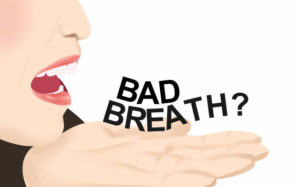Halitosis, popularly known as bad breath, is a condition that affects wide array of your health. Besides inducing stinky odor, the condition could lead to health risks, such as lowering your self-esteem. With bad breath’s perilous effects to our oral health, it pays to learn the root causes of its existence.
Bad breath, theoretically, is the undesirable release of volatile sulphur, hydrogen sulphide and methyl marcaptan in the atmosphere. This results in a stinky breath that makes your mouth awfully smelly. Every time you spoke to your friends or loved ones, you become conscious as its evident effect lets other people know your mouth is in some sort of rotting condition. Bad breath happens usually when you lack of proper oral hygiene. This means you’ve been practicing bad oral habits for a very long time. You lack of proper brushing and flossing of teeth which encourages local irritants to transpire, progress and spread. Of course, these local irritants refer to as dental plaques, tartars and food debris.
When you combined dental neglect with the following factors, bad breath may also take place. Dental professionals proved these aspects as possible reasons of getting awful breath.
Foods, like cheese, garlic, onions and dairies, enhance bad breath probabilities. This is because these food items release strong gases in your digestive area. These stinky gases can develop unpleasant smell within 24 hours, increasing your chances of having halitosis if left ignored or disregarded. Moreover, unchecked tongue causes bad breath, too. As we all know, human tongue can harbor bacteria that can result in bad breath. Medical conditions can trigger bad breath. Health experts and dental professionals proved this as there are certain conditions, like diabetes and kidney failure, happen to improve and increase the potential risks of bad breath.
Other factors that cause bad breath are excessive use of vitamins and existing dental problems. Based on experts, large intake of vitamins can empty your stomach. Aside from causing stomach ache, these supplements can induce bad breath. As for existing dental problems, dentists proved dry mouth as among the root causes of halitosis. Dry mouth is a condition that reduces your saliva production. Dentists also technically called this as xerostomia. Other dental problems that trigger bad breath are cavities, dental abscess and gingivitis. Cavities mean having a decayed tooth. It causes stinky odor and a pocket of pus, known as dental abscess. Pus contains bacteria that could contribute to periodontal disorder, otherwise called as gingivitis. This mild form of gum disease affects your gums, causing it to bleed.
The complex effects of bad breath let you learn how important it is to treat it. Luckily, there are several therapies you can reconsider. The most basic technique against halitosis is proper oral hygiene and regular visits with 24 hour dentist in Los Angeles. Through brushing and flossing your teeth on a daily basis, you can prevent and combat the potential risk of dental plaques, tartars and other local irritants.
When you see your personal dentist, you can uncover several ways to fight halitosis. Dentists help you overcome all types of dental problems, including having undesirably mouth odor.
